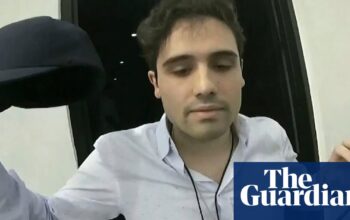A man’s body was discovered in a dam at a Del Monte pineapple farm in Kenya last month, prompting an investigation by human rights organizations.
Peter Mutuku Mutisya, 25, was found dead in a dam on Del Monte’s plantation near Thika on November 17th. This was four days after his friends claimed he went there to steal pineapples.
The Guardian and the Bureau of Investigative Journalism (TBIJ) conducted a joint investigation that uncovered new developments. These developments involve allegations of violent attacks and deaths by security guards at the farm, which is the biggest supplier of Kenyan goods globally.
Following the June disclosures, Del Monte pledged to continuously enhance its operations in order to comply with the most rigorous global human rights standards.
A report conducted by the authorities concluded that Mutisya died from drowning and found no visible signs of injury. A doctor hired by Del Monte also participated in the investigation and authored their own report.
The Guardian released two reports and a picture of the deceased to a prominent British forensic pathologist. According to him, the body displayed potential signs of harm, such as injuries to the head and arm. He also noted concerning omissions in the postmortem write-ups.

A representative from Del Monte, the largest supplier of pineapples in the world, stated that they fully collaborated with Kenyan officials during their investigation last month and expressed their heartfelt condolences to the family.
They stated: “Based on the postmortem report that was authorized by the director of the Criminal Investigations Division and four attending doctors, it was determined that the person died from drowning and there was no evidence of any wrongdoing.”
The KNCHR and the Kenya Human Rights Commission, a non-governmental organization, are jointly conducting an investigation into the case.
The CEO of KNCHR, Dr Bernard Mogesa, stated that the case is currently being investigated by their complaints and investigation division. The Kenya National Commission on Human Rights is committed to uncovering the truth and ensuring that those responsible are held accountable for any illegal actions.
The commission, formed by a law passed in Kenya, has declared a wider examination of reports of violence and deaths at Del Monte in June following the release of articles by the Guardian and TBIJ. However, it has not yet released any conclusions.
On the day of the discovery, Brian Olang K’Olang, a programme officer working for the Kenya Human Rights Commission, visited the morgue to view the body and speak with witnesses. He reported observing injuries to the back of Mutisya’s head and other areas.
He thought it was clear that something was not right. “I think foul play was involved.” He is worried that the pathologist may have intentionally disregarded the indications of harm.

According to an article in The Guardian, 27-year-old Martin Chege Mutuku stated that he and a friend accompanied Mutisya on November 13th to steal ripe pineapples. Mutuku recounted that while they were leaving the pineapple field, Mutisya had gone ahead and three guards suddenly appeared. Mutuku alleged that he was apprehended, physically assaulted, and restrained on the ground. Legal documents indicate that Mutuku was arrested the following day for stealing from the farm that evening.
Another man reported that he managed to escape without injury. Mutuku stated that he was lying on the ground when he heard Mutisya coming back with bags, prompting two guards to pursue him. “I heard a scream and then everything went quiet a few minutes later,” he alleged.
Samuel Katendie, the father of Mutisya, witnessed his son’s corpse and noted evidence of bleeding from the back of the head and apparent strangulation marks on the neck. While postmortem examinations can reveal damage to the body, it is important to document all abnormalities.
Mutisya’s father expressed that his son was a proficient swimmer and he struggled to comprehend how he could have drowned. He also shared his disappointment in the lack of justice after the doctor’s report on November 22nd stated that there were no injuries found during the postmortem.
A personal pathologist hired by Del Monte was compensated for attending the postmortem. In his report, he stated clearly that there was no indication of a third party being involved in the person’s death, as no injuries were found during the examination.
A prominent forensic pathologist in Britain, who wishes to remain anonymous, stated that it is unacceptable for any pathologist to make such a statement. They pointed out discrepancies in the postmortem reports, which call into question if they were intentionally written to support the theory that Mutisya drowned.
He and a colleague who studied the documents observed that the only official autopsy report mentioned petechial haemorrhages, tiny bleeding spots around the eyes. This could suggest strangulation, but could also be caused by drowning or other factors. They pointed out that this should have warranted a written record of a thorough examination of the neck, but neither report included this information.
The pathologist hired by Del Monte from Kenya stated that his conclusions were accurate. “My report is very clear. This is the usual procedure for forensic postmortems.” He doubted that any pathologist could accurately comment on a decomposed body based on a photograph.
A representative from Del Monte stated that they have confidence in the Kenyan legal system. They maintain strong commitment and support for the local community in Kenya, as well as for their employees and their 135-year history of advocating for human rights. Del Monte has consistently supported the community and takes their social responsibility very seriously in Kenya, just as they do in all other locations where they operate.
The representative stated that the Kenyan government is spearheading the investigation, however, the police did not respond to any requests for comment.
Source: theguardian.com


